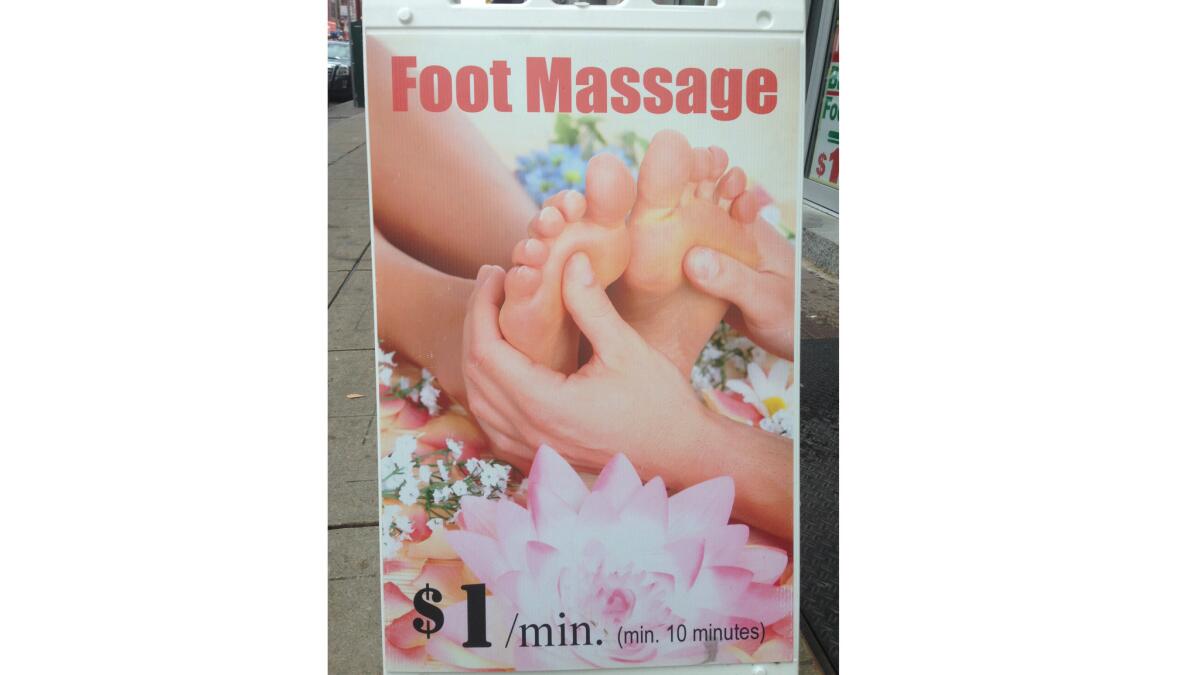Opinion: Is our speedy, instant gratification culture making any of our lives better?

- Share via
A recent article in the New York Times discussed how business schools are trying to adjust to the digital age: an MBA program at Cornell Tech, for example, in one year instead of the typical two. “Speed and integration have to occur at a different level,” said Douglas M. Stayman, associate dean. I get it, but it got me once again thinking about how just about everything is being reduced in time.
Last year, my New Year’s resolution was to live in the moment. This year, it is to stop thinking everything can be achieved in moments.
This is no easy task, since our gadgets are getting slicker and faster, while the messages we “compose” on them are getting shorter and dumber. At the same time, everywhere we look, someone is promising that if we pop in and pay, we will get prompt results. Having our hair blown in 20 minutes or less at blow dry bars is one (not so bad) thing, but now we can have our skin cleaned, and pigmentation reduced, with quickie walk-in laser treatments; find mindfulness in 30-minute meditation sessions on L.A.’s Westside; have our shoulders and necks rubbed for a few add-on minutes and dollars; watch entire TV seasons in a day; and pitch potential Broadway shows in the time it takes to brush our teeth.
I am not kidding about the latter. I was among a group selected to “meet” 10 theater producers for an excruciating hour of “speed-pitching.” We had two minutes to describe our play, and they each had two to respond with questions. (Usually something profound, like “How would you see this marketed?”) I was halfway through when I found myself wondering, what would Tennessee Williams and Arthur Miller have said? “It’s about a lame girl who collects little glass animals.” “It’s about a salesman who is aging out.”
Some claim that these speedy “solutions” offer instant relief from hectic juggling. While I agree a good hair-wash and momentary muscle kneading can feel good, relief is something I associate with taking an Imitrex for my headaches. This is, let’s face it, about something else. “We are biologically programmed to want instant gratification, and given a choice, adults still prefer it,” says Vivian Diller, PhD, a New York psychologist. “But we learn that there is no way to instantaneously raise our intelligence or achieve weight loss. Consequently, anything that provides a promise of immediate results is appealing and facilitates a sense of control and optimism.”
One also has to consider whether the pop-in populace is being “treated” responsibly or just being ripped off.
Those in the meditation world are slightly more forgiving of the incredibly shrinking sessions being offered in their name. “There’s no downside to providing another entry point that works,” says instructor and co-author of “The Three Minute Meditator,” Nina Smiley. “Even multi-taskers have three minutes.” Los Angeles author and meditation instructor Diana Gould is a tad more skeptical: ”It’s such a funny idea, paying for 10 minutes of silence. I guess if it gives people a taste and leaves them wanting more, it’s to the good. But the real benefits are harder won, and this is not to be confused with the real thing.”
There are, to be sure, some things I wish were shorter, such as the NBA season, Paul Thomas Anderson movies, Donna Tartt books, presidential campaigns and wedding speeches made by the best man. But more is at risk of being lost in the Drybar-ization of America: the beauty of real correspondence, for starters. I am not so naive as to call for a return to actual letters. But emails, not to mention tweets, are hardly going to add much to future memoirs.
Likewise, the art of long-term thinking, in general, is being sacrificed, as we become a short-order society. It is bad enough that daily poll numbers, overnight TV ratings, weekend box-office figures, and afternoon stock reports carry seemingly life-or-death import. The best ideas were not developed or created in minutes.
Finally, the whole sense of taking time to savor something is jeopardized by this hurry-up and look and feel better, even watch faster mentality. I plead guilty to having binged on “Breaking Bad” in two weeks, but I have returned to enjoying the weeklong anticipation of a new episode of a favorite show. I may even return to my chatty and cozy hair salon. The slow-food movement, it should be noted, has made a valiant attempt to get us to put down our knives and forks long enough to consider what we are eating and where it came from. Even mourning, I dare say, is suffering, with many expecting those who have lost loved ones to get back in the game ASAP. Hey, they are grieving as fast as they can.
Everything is coming at us faster and shorter. In the case of those MBA candidates, they are supposedly getting out in the workplace earlier, so they can start up and make their billions. All this is allegedly reducing our stress level. Really? How many of us worry more when our kids don’t answer the texts right away? How many of us are upset when we feel tight and tense an hour after that so-called massage, and depressed when the sunspots return in the a.m.?
Not to mention when all that mindfulness from your meditation quickie is gone after being stuck on the 405.
Michele Willens is a freelance writer whose work has appeared in the New York Times, the Daily Beast and the Atlantic.
Follow the Opinion section on Twitter @latimesopinion
More to Read
A cure for the common opinion
Get thought-provoking perspectives with our weekly newsletter.
You may occasionally receive promotional content from the Los Angeles Times.






